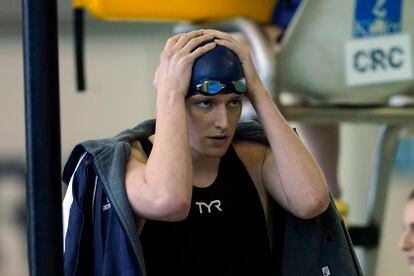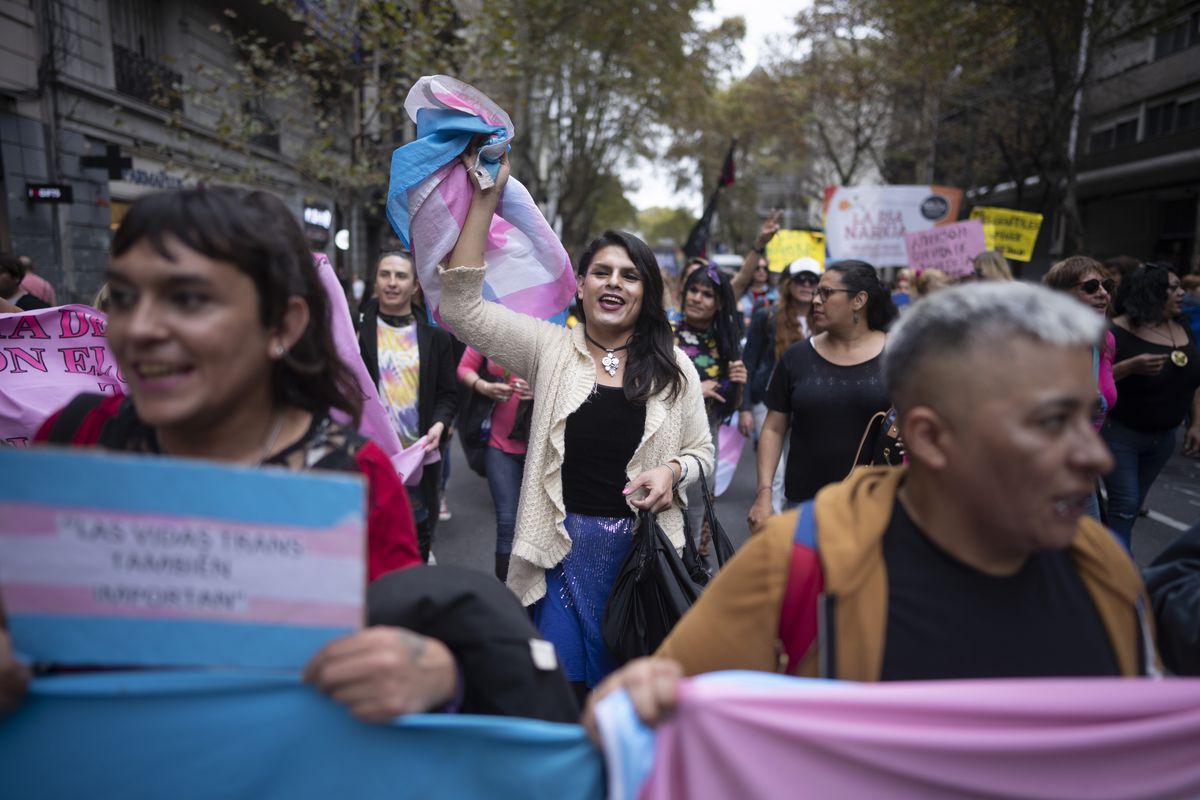The New Zealander Laurel Hubbard, at the 2020 Olympic Games.Miguel Gutiérrez (EFE)
New Zealand weightlifter Laurel Hubbard became the first trans athlete to compete in the Olympics last year in Tokyo.
She didn't win.
She didn't even make it to the final in her category (+87 kilos).
Despite this, her participation generated "controversy", as she herself described.
Hubbard thanked the International Olympic Committee (IOC) for having been able to participate in the competition: "It reaffirms the commitment to the principles of Olympism: sport is for all people, inclusive and accessible," she said then.
Not even a year has passed since those words and the International Swimming Federation (FINA) has just approved a change in its regulations that vetoes trans swimmers from the female categories if they have not made their transition before the age of 12.
The reason:
considers that they have a competitive advantage over cis women (whose gender coincides with the sex assigned at birth).
Its rugby counterpart (World Rugby) has announced a similar measure, while FIFA (soccer) and World Athletics (athletics) have launched processes to review their policies regarding trans people.
"It should not be assumed that trans women have an advantage over cis women," says the IOC.
The body recommends that no athlete be excluded from a competition based on a supposed competitive advantage.
They are guidelines aligned with the demands of the LGTBI collective and that are part of the framework proposal for inclusion and non-discrimination, approved by the body at the end of 2021. In that presentation, any requirement for trans women to compete was withdrawn (before their blood testosterone levels were studied or in some disciplines they were required to have had a vaginoplasty at least two years before the competition).
It also left it up to the international federations of each sport to establish their own protocols regarding trans people.
“The IOC has washed its hands”,
criticizes David Guerrero, journalist and president of the Sport and Diversity association.
“They have justified his decision in a lack of power to regulate all sports disciplines.
But the reality is that by doing nothing, they are tolerating
LGBTIphobia
: the expulsion of trans people just for being so”, adds Guerrero, author of the essay
You run like a girl
(Dos Bigotes), where he analyzes gender stereotypes in sports.
Swimmer Lia Thomas warming up before competing in the NCAA 500-yard freestyle at Georgia Tech in Atlanta in June 2022. John Bazemore (AP)
"Sport seeks to establish a level field between the opponents, and for this it segregates by categories based on objective characteristics such as age, sex or, sometimes, by weight", summarizes the sports advisor Irene Aguiar in her presentation
Women's sport and people transsexuals: an approach to the current situation
, presented at the last Spanish Congress of Sports Law, in November 2021. Aguiar considers that trans women have a competitive advantage: “Testosterone is a clear difference.
From puberty, this hormone increases its presence in the male body to show blood concentrations 20 times higher than those of a woman.
Testosterone produces higher mass, higher muscle and bone density, larger lungs and heart, lower fat, higher hemoglobin levels, broader shoulders and chest, or narrower hips,” she says.
“It is taken for granted that all trans women are tall, muscular, and that is stereotyping,” says Guerrero.
“We are not talking about trans men, but only about them: machismo underlies because the idea that women are worse in sports is perpetuated and, therefore, they will never be a threat to a man.
But yes the other way around.
It is a concatenation of stereotypes”, he continues.
“I would like to know what the trans advantages are: I have never seen them,” replies Nora Gómez, 64, a salesperson and athlete.
She started in ice hockey when she was 14 years old and with Txuri Urdin she achieved several triumphs.
At 26 she got married (nearly three decades of marriage), she had a son and over time she entered the veterans.
“I stopped playing when I started my transition process: I needed time for myself,” she explains.
speed differences
After four months of hormonal therapy, trans women show similar levels of testosterone in the blood than cis women.
This is one of the conclusions drawn by Joanna Harper, a transgender scientist and athlete, in a groundbreaking study she conducted in 2015. Harper, a physician and IOC advisor, later published another report on hemoglobin in which she found similar behavior.
In addition, the researcher found in her own body that nine months after starting the treatment she ran 12% slower than before.
A very similar speed difference to that shown by cis men and women running a marathon (11.1%), according to a 2020 study by Run Repeat and the International Association of
Ultrarunners
(IAU).
Another of Harper's discoveries was that after three years of hormone therapy there is a decrease in muscle mass, although less than in the cases mentioned.
"Eligibility [in sports] should be based on some biomarker," says Harper, who asks not to stick exclusively to the binary categories of male or female.
“It's going to take time to get hard data on trans women in elite sports,” she adds.
When her transition was over, Nora Gomez decided to host a potluck with her former ice hockey teammates.
“Only one was missing because it was impossible for him.
It was wonderful".
Her friends suggested that she play again, now on the women's team.
"I went to the first practice and it was good," she recalls.
“Before starting, the coach told me that I had to change in a separate locker room.
Alone.
I did not think it was important".
Her companions, yes: in the next meeting, several went to change with them.
"We all ended up in the big locker room, together."
Returning to the practice of her favorite sport was very rewarding for her: "I am the only person in ice hockey who has played in the men's and women's teams in the national league."
"I would have liked to make it to the Spanish team," continues the woman who currently plays with the Millennium Panthers and who is also the founder of the Dekumas LBT organization for lesbian, bisexual, cis and trans women.
She considers that she has been lucky: “I have always felt sport as a safe environment.
But there are many other cases where things are different.”
contagion effect
"I don't hang up my boots, they hang them up for me."
Trans soccer player Valentina Berr, 29, has just announced that she is retiring from professional sports.
"I have been silently suffering for four years the hatred and structural violence against trans women by institutions, the media and many people who are dedicated to harassing people who are out of the norm," explained the second player. trans federated soccer player in Spain announcing his departure from the Barcelona club CE Europa.
Player Valentina Berr, left, during a match in 2018. Cristóbal Castro
For many experts, this targeting of elite trans athletes has a perverse cascade effect, as it encourages them to be expelled from other spaces within grassroots sport.
"The debate on the competition can hide a daily discrimination in the practice of sports that trans people suffer", warns from the Ministry of Equality, which has just approved the draft of the so-called
trans law
.
This rule does not prohibit regulations similar to those applied by FINA, "but it must be done in a proportionate, justified manner and with the perspective of respect for human rights, as indicated in the latest IOC directive."
For its part, the Spanish Constitutional Court has just declared in a ruling that all discrimination against trans people is illegal.
Equality is concerned that [with the veto to compete] "the stigma against minors, adolescents and trans youth is being reinforced."
In the Sports and Diversity association they confirm that they have dealt with several cases in youth leagues of vetoes of eight-year-old trans boys and girls for an alleged competitive advantage.
“It is an excuse to be transphobic”, says the president of the association: “They are ignoring that differentiating development does not occur until puberty, they are leaving aside the inclusive and healthy values of sport.
Federations that exclude trans people influence other recreational or amateur organizations and competitions.
Few people make it to the elite.
Less if they are trans.
And all the ones that do it are spectacular”, continues Guerrero.
That is why he regrets that every visible success of trans women is questioned: “We have seen it with Laurel Hubbard, with Lia Thomas or now with Valentina Berr.
With this antecedents,
You can follow EL PAÍS Deportes on
and
, or sign up here to receive
our weekly newsletter
.
50% off
Exclusive content for subscribers
read without limits
subscribe
I'm already a subscriber


/cloudfront-eu-central-1.images.arcpublishing.com/prisa/BLYUJBPZE5HWFP3B5QYDATMI7I.jpg)

/cloudfront-eu-central-1.images.arcpublishing.com/prisa/MG6G7DJUBNBLRNE2DSTK4WZYTY.jpg)



